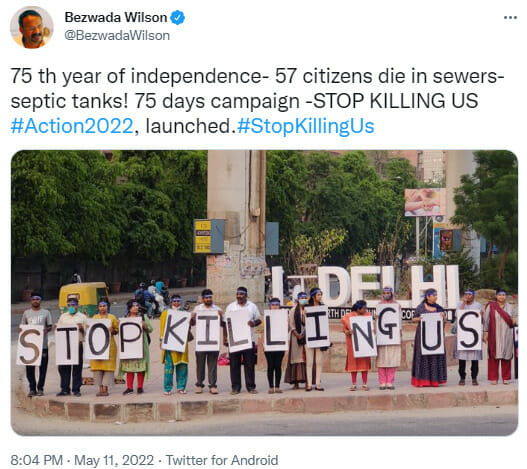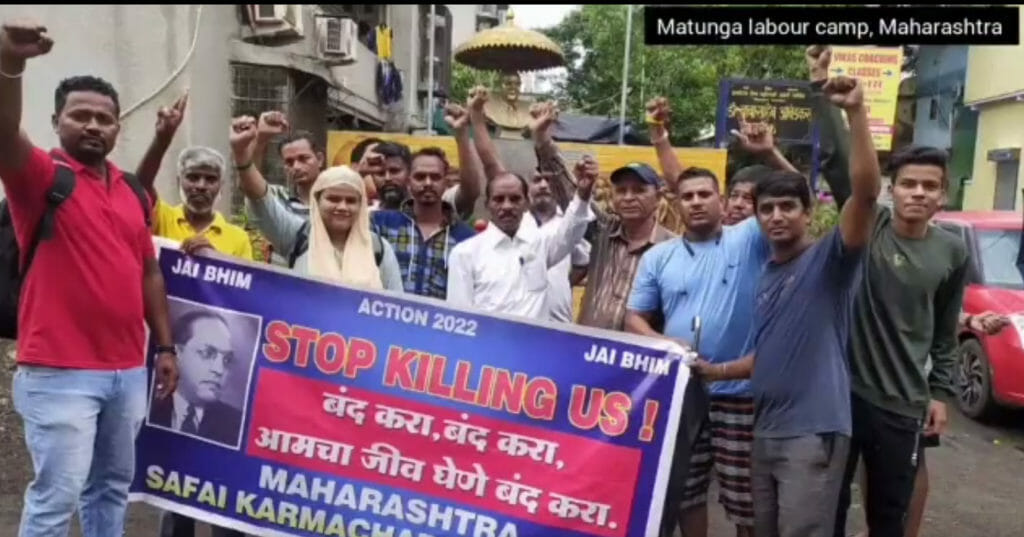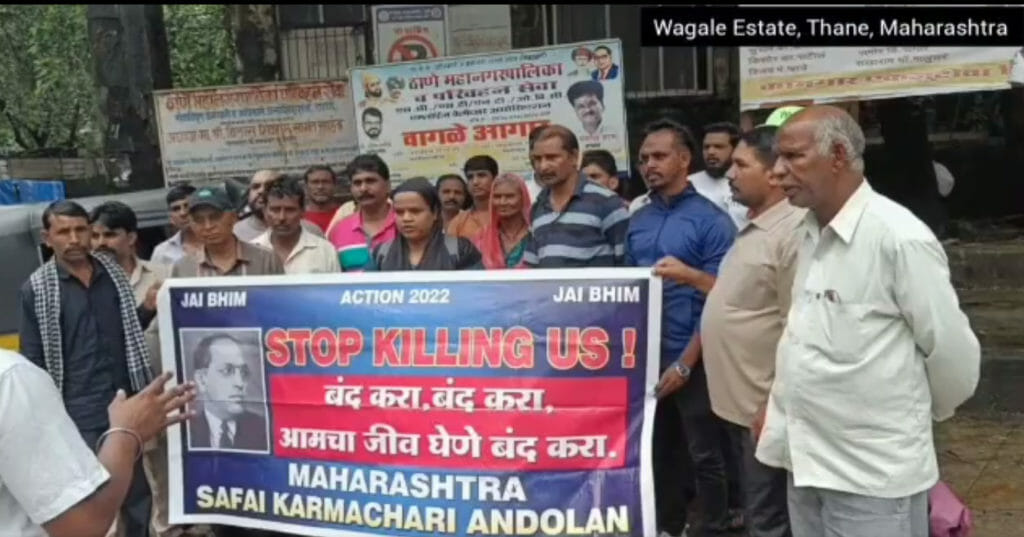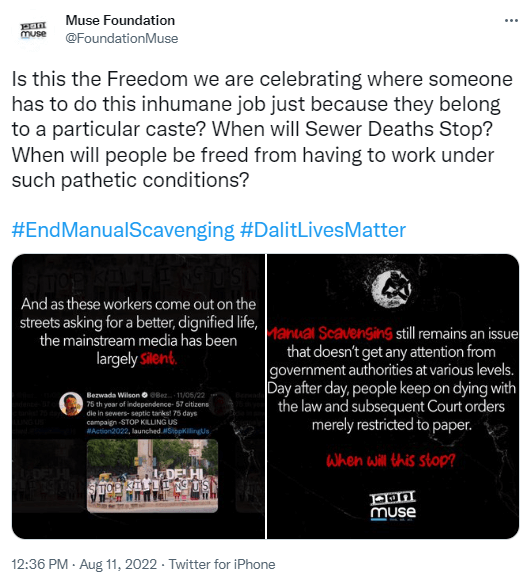As India completes 75 years of independence, it is important to critically examine freedom that is now reduced to mere symbols and performance. While the privileged enjoy comfortable lives, vulnerable communities, like lower-caste groups, live on scraps and do inhumane, caste-based jobs for a living. Generations of people are forced into cleaning excreta in sewers despite several technological and scientific advancements that should make the work of manual scavenging less labour-intensive.
The state has repeatedly failed at bare minimum provisions to rehabilitate these workers, despite a ban on manual scavenging. Now, a nationwide campaign called Stop Killing Us is expressing rage against this discrimination.

What is the campaign about?
The campaign, started by the Safai Karmachari Andolan (SKA), is spearheaded by senior activist and National Convener, Bezwada Wilson. It aims to draw attention to the pathetic conditions of manual scavengers.
According to government data, 347 people lost their lives (2017-2021) due to the cleaning of hazardous sewer and septic tanks. The SKA says the figures are higher at 539. The government has not implemented the law effectively. It has even claimed that no manual scavenger deaths have taken place in the last five years.
It was initially a 75-day campaign in line with the celebration of 75 years of Independence celebrations. However, the campaign has now continued for more than three months. Members of all the major districts and capitals across 18 states have joined the campaign.

Why has the law failed to address the concerns of those in manual scavenging?
The Prohibition of Employment as Manual Scavengers and their Rehabilitation Act, 2013, has not been implemented yet, ensuring the continuation of the occupation. In many states, including Maharashtra, many families** have not received any compensation for deaths while on the job, and no scheme for mechanised cleaning currently exists.
Neither has there been a proper survey in all the districts across the country nor have the authorities arrested the contractors in the cases where deaths have occurred.
A proper survey of manual scavengers across the country has not been conducted, while authorities responsible for their employment walk free.
In Thane, on 9th May 2019 around midnight, Amit Puhal, Aman Badal and Ajay Bumbak, all sanitation workers, died due to asphyxiation from inhaling toxic gases in a sewer. A total of eight sanitation workers were employed there, of whom five were hospitalised and three succumbed to their injuries. They were not provided with any safety gear as the law mandates. Thane Municipal Corporation (TMC) did not grant any permission for the work, as necessary. In violation of the Supreme Court order from 2014, authorities have not compensated the families and a swift process to ensure that families do not face any hurdles while receiving compensation currently does not exist either.
The law clearly states that municipalities must ensure no one employs a person for manual cleaning of sewers and septic tanks, especially without the necessary gear. But the corporation has not ensured its implementation.
In March 2022, Hanuman Korpakkvad and Suraj Madve, both sanitation workers, died while cleaning a septic tank at Grace Square Society in Mumbra, Thane. The Mumbra Police Station registered an FIR, however, it did not charge the contractor, the occupier and the officials of TMC.
Read more: Thane authorities deny manual scavenging in the area, but evidence suggests otherwise
In all the cases, there is a certain negligence and apathy shown by the TMC. Had they acted according to the rules, none of these workers would have died. The TMC, then, is responsible for these deaths and there is an urgent need for the authorities to address this issue. Municipal corporations are evading responsibility under this contractual system making grievance redressals out of reach for the workers.

What are the demands of organisations fighting against manual scavenging?
At Muse Foundation, a youth organisation active in Thane and Mumbai, we have been advocating for awareness of manual scavenging. Through various campaigns, we have been urging the municipal corporation to follow the law – a bare minimum at this time.
We urged citizens to send emails to the Chief Minister containing a copy of the 2013 Act to demand its implementation. Over 300 emails were sent as part of this campaign. To counter the TMC’s claim that no manual scavengers work in its jurisdiction, we started a campaign called #ClickTheTruth. As part of the campaign, citizens shot pictures capturing instances of manual scavenging in the city. The photo evidence serves as proof against all the lies of TMC.

The law is not just meant to be on paper and municipalities should implement it without any delay. They should conduct surveys at the earliest to get data on the number of people who do sewer cleaning. The authorities should rehabilitate them to other skill-based occupations after paying the necessary compensation. The sewage department should survey the entire city to understand the faults in the sewer lines.
Municipal corporations should compensate the families of all the people who have died without any delay. Our dream of a free India is incomplete if the authorities do not mechanise sewer cleaning. We are planning to file a petition soon in this regard. We will also come up with more campaigns to raise our collective voices against this practice. Join the work we do by filling up the form here.
**Errata: The first published version of the article had mentioned that no family anywhere had received compensation, which has been corrected to present a more factually accurate picture. The initial error is regretted.